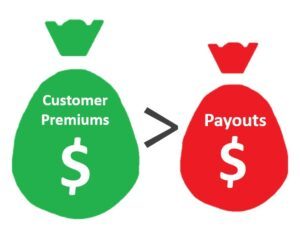Yes, you can. But are these plans worth it?
If you don’t have access to dental coverage through your employer, you might be looking for an individual or family dental insurance plan you can buy on your own.
There are plenty of options.
Before you decide whether or not you want to purchase dental insurance on your own, it helps to understand the business model from a bird’s eye view.
 Business Model
Business Model
Just like all other businesses, dental Insurance companies are designed to make money. That means that collectively speaking, the insurance company’s customers need to pay more in premiums than the company pays out for dental procedures. If that doesn’t happen, the insurance company can’t possibly stay in business. It’s just math.
These companies know what they’re doing. Like a casino, the house always wins. Their actuaries make sure of it.
Despite that, it is very likely that you will save money if you buy one of these plans. I reviewed quite a few options in great detail and stacked them up against typical treatment needs of a typical patient.
In the end, my hypothetical patients fared better with an individually purchased plan than they would have without it – even factoring in the cost of the insurance premiums. I was actually surprised by this result.
But, don’t get your hopes up too high. No plan will rescue you. If you have a lot of treatment needs, you’re still looking at a large out-of-pocket expense. Don’t blame the plan. There’s simply no feasible business model that allows you to pay a small monthly premium and get thousands of dollars in coverage.
Insurance is a Misnomer
Oxford Dictionary definition of Insurance – a thing providing protection against a possible eventuality.
For many people on the market for dental insurance, dental problems aren’t a possible eventuality. They’re already here.
We purchase homeowner’s insurance in case a catastrophe strikes. We don’t expect our house to catch on fire. But, if it does, we’re covered. The risk is pooled among many other homeowners. That keeps our premiums reasonable.
Conversely, many people on the market for dental insurance have mouths that are already on fire (so to speak). They often know they need some work. That is why they’re searching for a plan to help them pay for it.
Instead of insurance, think of these plans as more of a payment management tool or a coupon.
Self-Sponsored PPO Dental Plans
Plans that you purchase on your own are typically Preferred Provider Organization or PPO plans.
In this type of plan, you can technically use it for any dentist you want. You can go outside the PPO network. But, you’ll usually get a much better price if you see an in-network dentist.
When dentists agree to be in-network, what they really agree to is to:
- abide by the fee schedule mandated by the insurance plan.
- collect all of the required co-pays from the patient.
Insurance Fee Schedule
When you’re using your insurance to see an in-network dentist, your dentist does not decide what fee to charge for procedures. The insurance company decides. Their fee schedule is heavily discounted. The discounted fee schedule is the main advantage of these plans.
If you do choose to go outside the network, your insurance will still kick in some coverage. But, it will be limited to the assigned percentage of their assigned fee. Your out-of-network dentist can charge any fee he/she wants. You’re responsible for the difference between what your insurance pays, and what your dentist charges.
Non-Covered Procedures
Some procedures may not be covered by a given plan. In that case, your in-network dentist may or may not be obligated to charge you the fee on the insurance fee schedule. It depends on what state you live in. In most states, dentists are off the hook and can charge any fee they want for non-covered procedures.
However, in these eight states – Delaware, Hawaii, Maine, Massachusetts, Michigan, New York, Ohio, and South Carolina – you’re in luck. Participating dentists are still legally obligated to use the fee schedule dictated by your insurance plan even when your insurance plan offers no coverage for the procedure.
Patient Co-Pays
Insurance companies know that if you have to pay a co-pay, you may decide to put off your dental work. They want you to have this disincentive because they won’t have to pay their portion if you don’t get your work done. That’s why we are required to collect them.
On the upside, this policy does prevent many people from taking full advantage of their plan. It’s like a gym membership. Not everyone uses it. That helps to bring down the cost of PPO insurance premiums.
Individual Plans Overview
There are so many different options with different annual maximums, covered procedures, co-pays, etc. It is beyond the scope of this post to go through every nuance of every plan.
One adult should expect to pay somewhere in the range of $25 to $80 per month for a typical plan. Your premium depends on which plan you choose, your age, and your zip code.
Most plans will pay for a comprehensive exam, preventative cleanings, and a full series of x-rays. Beyond that, it varies significantly. There is no plan out there that will cover every dental procedure. But, the more expensive plans offer more procedure categories than the cheaper options.
Plans will pay up to an annual maximum. Often it is somewhere between, $1,000 and $2,500. To get the full benefit out of your plan, you would need a lot of work and that work would have to fit into the coverage offerings of the plan. In other words, the planets would have to align! There is no way that these companies could afford to pay out the maximum benefit for most patients. The premiums are too low to cover it.
The Fine Print
Many plans have waiting periods for certain procedures. That means that you are not eligible for coverage until you have been paying your premium for the required time – maybe 6 months or 12 months. if your issue is urgent, you may not have the luxury of waiting for your coverage to kick in.
Some procedures have frequency limitations. For example, if your plan offers coverage for replacing a missing tooth, you may only be eligible for one prosthetic service per year.
Another clause to look out for in the fine print is the “missing tooth clause.” If your insurance has one, it will not pay to replace a tooth that was missing prior to getting the plan. Your missing tooth would be considered a pre-existing condition and replacement services for that tooth are not covered.
Super-Savvy Money-Saving Hack
The best way to really determine which plan to choose is to really know your treatment needs FIRST! I know. If you do that, you will not get the benefit of having your initial exam paid for by your dental plan.
Do not worry about that. Initial exams are cheap. Dentists want to get you in the door. That’s why so many practices offer deeply discounted rates for initial exams.
Our private practice charges $99 for an initial exam and full mouth series of x-rays. A popular dental chain in my area charges just $59. Be super-savvy and take advantage of those deals! You don’t need to use the same office for your dental work. Just get your exam done to get a sense of your treatment needs.
Be sure to ask about urgency. For example, do you have deep cavities that can’t wait out a six-month waiting period? Take your treatment plan home with you and stack it up against various plan offerings.
Self-Sponsored Insurance Alternatives
Discount Plan
Instead of buying a PPO style plan, you can also purchase a straight-up discount plan. Discount plans don’t offer any coverage for any procedure. But, they give you access to a deeply discounted fee schedule for all procedures. In exchange, the dentist gets a pool of patients who have signed up for the plan.
Of course, you will be limited to the dentists who have agreed to accept the discount plan. Before you sign up, be sure that there are good dentists in your area who will take it.
Negotiate with Your Dentist
If you don’t want to buy any plan, another strategy is to negotiate directly with your dentist. Most dental offices offer in-house savings plans. Typically, you are asked to pay an annual premium to the office. In exchange, you get discounted rates on all procedures. However, the discounts offered by your dentist typically aren’t nearly as generous as an insurance or discount plan fee schedule.
So ask for more! Ask your dentist to honor the fee schedule of a typical insurance plan. Tell him or her that you’d otherwise purchase an individual plan. I’m sure your dentist would appreciate avoiding the hassle of submitting insurance claims. You can both skip the middleman and work directly together.
For some tips on the best way to negotiate with your dentist, click here!
Good luck on finding the best plan for you. If you have any questions please comment below!


Since I am a digital nomad I do not have any dental insurance. It might be a bit more expensive in the long run, but I do like the flexibility. Also, the fact that I am not bound to a country gives me a lot of freedom. But, I may reconsider if I’m in the same place for a long time.
Great article!
These plans are designed for the US private healthcare system. If you’re living in the US, then it may be an option for you. Dental care is less expensive in other countries. Wherever you are, be sure to get a cleaning and check up at least every 6 months. Happy travels!
Wow, this is new to me, I did not know that you could buy such insurance or if there was such insurance. This is something I myself should look into and see what all these types of insurance offer. I am sure there are many like myself who this is new to as well. Thanks for sharing.
Hi Norman! Yes, there are plenty out there. If you haven’t been to the dentist in a while, and you don’t know what’s going on, then, it’s best to get an exam first. Go to a dentist who offers an inexpensive exam for new patients. There are plenty. Then, you can look at the proposed treatment plan and use it to determine the best insurance product for you. If you’re in excellent shape and need no more than a couple of preventative cleanings per year, then you may not need any plan at all.